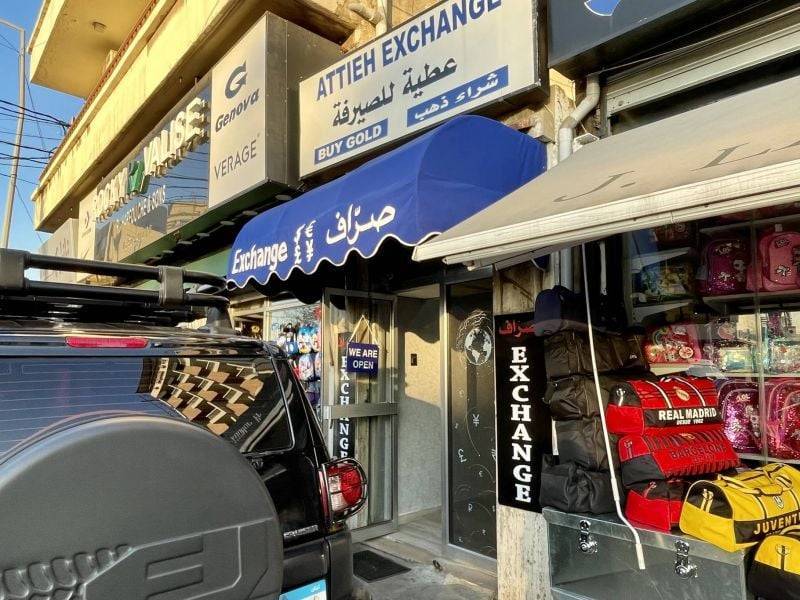
A currency exchange shop in Hazmieh. (Credit: Philippe Hage Boutros/L'Orient-Le Jour)
Want to get the Morning Brief by email? Click here to sign up.
Banque du Liban announced that Al-Mawarid Bank will allow depositors from all banks to withdraw an unlimited amount of dollars at the Sayrafa rate. “Priority will be given to our customers, but those of other banks will also be served,” AM Bank CEO, Marwan Kheireddine, told L’Orient Today, adding that the 19 branches will remain open until 5 p.m. on Dec. 31, Jan. 1 and Jan. 2. The measure is particularly relevant to customers whose banks have yet to remove ceilings on dollar withdrawals at the Sayrafa rate, in line with a Monday BDL decision countering long-standing monthly limits of approximately $400 for the majority of depositors. The central bank on Monday also raised the Sayrafa rate to LL38,000, narrowing the gap with the parallel market after the lira fell to record lows in recent days.
The Energy Ministry replaced the Sayrafa exchange rate with the parallel market rate, causing a sharp rise in fuel prices. The ministry credited the shift to a "written request" from caretaker Prime Minister Najib Mikati as 20 liters of 95-octane and 98-octane gasoline rose by LL80,000 and LL83,000, respectively — almost entirely reverting Wednesday's sharp drop in prices. Gas Station Owners' Syndicate spokesperson Georges Brax claimed the drop in prices caused refuellers to lose "LL800,000 per gasoline tank" while queues of motorists formed amid station closures. The queues recalled scenes from the summer of 2021, when the energy ministry gradually lifted subsidies on fuel until gasoline was entirely dollarized. The ministry regularly issues price lists setting the cost of fuel which, until this week, had relied on the Sayrafa rate.
Caretaker Interior Minister Bassam Mawlawi reaffirmed that municipal elections will be held on May 31, 2023. "We have already begun preparations," Mawlawi added. The Interior Ministry previously postponed the election of municipal officials and mokhtars (local officials responsible for records) due to a scheduling conflict with the May parliamentary elections. Awaiting the polls, shake-ups at different municipality leaderships occurred. Notably, the southern Lebanese municipality of Tripoli in October elected a new mayor under a special provision by Mawlawi after the ouster of the previous local leader on allegations of corruption. The same month, the northern Lebanon Arsal municipal council resigned, citing frequent conflicts between mayor Bassel Hojeiri, accused of "legal violations," and some council members.
Swedish authorities arrested a Lebanese man who allegedly murdered his wife in 2021, a lawyer representing the slain woman's family announced yesterday. Sweden's judiciary brought into custody Ibrahim al-Ghazal, implementing an Interpol warrant issued by a Lebanese judge for the suspected murder of Zeina Kanjo. Beirut's first investigating judge, Charbel Abu Samra, is waiting for Ghazal's extradition. Lebanese judges prosecuted Ghazal in 2021 after Kanjo was found suffocated in her Beirut home after having filed domestic abuse charges against her husband, reportedly intending to begin divorce proceedings. “Women are the first to pay the price" of Lebanon's compounded crises, activist Alia Awada said in August after the murder of Hanaa Khodr by her husband, echoing a similar claim by gender equality NGO Abaad director Ghida Anani.
In case you missed it, here’s our must-read story from yesterday: “Wartime holidays: Recollections of a Christmas tree on the Green Line and Bûche de Noël in a bomb shelter”
Compiled by Abbas Mahfouz